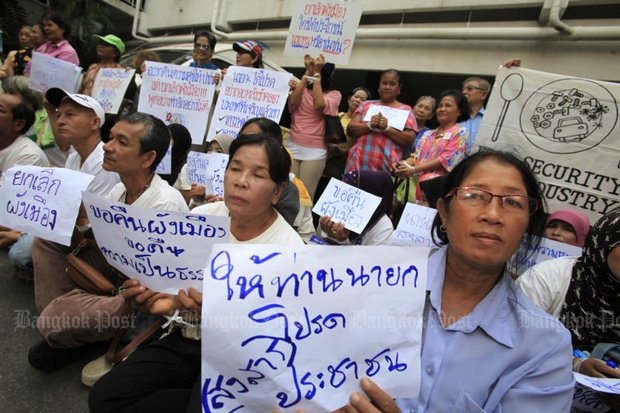
Environmental activists and local communities affected by development and power plant projects have renewed calls for the prime minister to revoke his orders speeding up the approval process for them.
They gathered Tuesday at the Office of the Public Sector Development Commission, opposite Government House, to renew their calls. The protest group consisted of some 100 activists and residents from various provinces, including Krabi, Chachoengsao and Pathum Thani.
They said that earlier this month they petitioned the prime minister to revoke both orders but are yet to receive any response.
The orders -- issued in January under Section 44 of the interim charter -- may fast-track controversial development projects by overruling regulations regarding town and country planning, which the residents consider to be environmental safeguards.
The National Council for Peace and Order (NCPO) orders effectively suspend previous city planning laws, which reserved "green zones" for conservation or agricultural purposes and "pink zones" for local communities in each province, said Prasitchai Nunuan, coordinator of the Save Andaman from Coal group.
"Industrial estates or power plants can now be built practically everywhere," he argued.
Order 3/2559 removes legal hurdles for the construction of industrial plants in 10 provinces set to become Special Economic Zones (SEZ). Order 4/2559 exempts power plants, including coal-fired, biomass and waste-to-energy plant projects, across the country from complying with past land planning regulations.
Mr Prasitchai added the orders would likely cause conflict between local communities and investors all over the country.
While the government pushes on with its development plans, locals will suffer if projects with high impacts on health or environment are no longer confined to industrial areas, instead operating near homes or forest land, he said.
"Who will take responsibility if our crops become affected by pollution from industrial projects?" Kampan Suprom, an organic farmer from Chachoengsao province, asked.
In the last decade, residents poured their resources into developing organic farming. They fought hard to obtain certification from foreign agencies, fearing their produce and quality standards will be affected.
Locals have opposed a coal-fired power plant project in the province's Khao Hinsorn area for the past eight years, she added.
The town and country planning laws enabled them to temporarily halt the plant's construction, as the area was reserved for agriculture and forestry.
However, if the land planning regulations are suspended, construction may go ahead, she said.
Under previous regulations, which included the 1975 Town Planning Act, locals could participate in the zoning and land partitioning process, said ENLaw Foundation manager Supaporn Malailoy.
The process included surveys in which officials and locals defined which areas were used for agriculture and habitation and which plots could be used for economic development, she said. Further, locals could examine completed plans before implementation.
"Public participation is crucial, since planning is affecting every one of us," Ms Supaporn argued.
Today, people are being pushed aside, while new regulations meet the policies and needs of the government and investors alone, she added.
The activists vowed to continue their sit-in this week, or until the government provides answers.